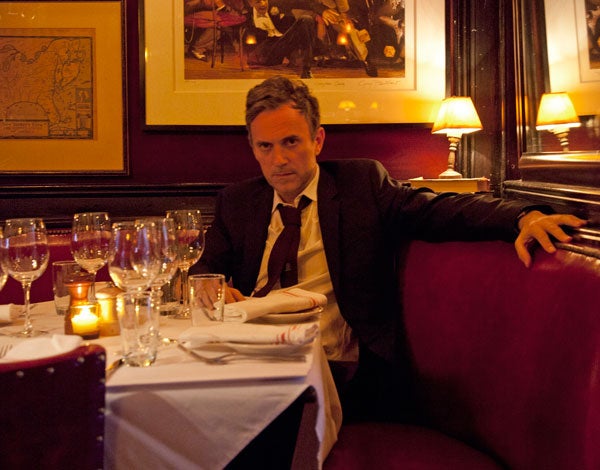
Anthony Haden-Guest reviews a neo-Flemingesque depiction of a very 21st century world of business and leisure
Stathis, the protagonist of Hotel Living, a first novel by Ioannis Pappos (pictured above), is the son of a Greek fisherman, propelled to a programming job in the Bay Area when a tourist spots his killer talent for backgammon. This is no leisurely Bildungsroman though.
‘When the tech bubble burst, so did my Silicon Valley enthusiasm and loyalty,’ Stathis confides. He is soon off to EBS, the European Business School, ‘the best business school in the world’, in the Fontainebleau forest outside Paris. We are still on the third page, by the way.
The distinguishing cultural characteristics of our time include giddy speed and multiple cross-referencing, both of which Pappos has down. Here is Stathis at EBS talking with Alkis, a London-raised Greek and a self-elected mentor:
‘It’s our right to keep nexting, Stathis.’
‘Nexting? Excuse me?’
‘Clients will approach us with some real opportunities.’ He leaned closer. ‘Clients will keep courting us to participate in their ventures. If you don’t like this one, you jump ship at the next one.’
‘What are you talking about?’ I asked skeptically.
Alkis adds: ‘Think of your job like a computer game that keeps throwing celebrands your way.’ I nodded along, speculating how many more words like ‘nexting’ and fucking ‘celebrands’ Alkis was going to come up with during dinner.
There’s more, more, until Stathis asks himself: ‘Who was Tyler Brule? Was Elon Musk a perfume?’
Pappos is not the first novelist to allow readers to roam the business culture, of course, as he is not the first to enrich his narrative with the names of posh people, pricey things and chic places – Bungalow 8, Sant Ambroeus, the Beatrice and the Waverly Inn, this being set in the mid-Noughties Manhattan, and, of course, the boutiquey, service hotels from which the novel gets its name.
Ian Fleming was a dab hand at this. The way Pappos does this is very new though I think, and it is very much a part of a culture evolving at an exciting, if slightly scary speed. The conversation I dip into above, for instance, is characteristic of a narrative – call it the not-so-sentimental-education-of-a-money-dude – that cracks like a whip and which involved me in goings-on which aren’t just prompted by mundane greed, but seductive, thrilling, fun. This may have the clang of the obvious for those who live the life, of course, but few writers have touched it and Ioannis Pappos nails it.
As to the posh people, places, things, well, when Ian Fleming, say, dropped a brand-name, he tended to sound instructional, de haut en bas, in the manner of Nancy Mitford letting the middle class know how to masquerade as upper crusters. Pappos is airier, as if saying this is where the wild things are and this is their habitat.
Some details are meticulously observational. As in: ‘She took a sip from her Airborne-Perrier, which turned her lipstick from red to bright orange.’ But if you don’t pick up on one of the references, well, bad luck, friend. As when Stathis is getting out of a Maserati in the Hollywood Hills. ‘This is a De Tomaso,’ I say, touching the redwood dashboard on the console. ‘They don’t make the Quattroporte like this anymore.’ Duh? But pure consumerist poetry. Especially to a non-driver like myself.
Stathis is gay, as is Pappos, and this is an element in the plotting of Hotel Living, but he comes across as matter-of-fact, indeed macho, sometimes startlingly so. As to the broader plotting, it includes a sticky cobweb of insider trading, but it is not my role to be a spoiler here so you’ll have to pay to play.

The characters include two well-drawn naughty girls, with one of whom, Tatiana, Stathis has a fling. And there is some evocative social, um, interaction. As in: ‘The Disney girl kisses a guy outside the bathroom and the door magically opens. Six, seven, eight of us cut the line and cram into a dark square room, the only light a dying low-hanging bulb above a ratty table by the sink. I’m in Abu Ghraib.’
This last reference being no casual flourish, by the way. It anchors Pappos’s narrative in the realities of our turbulent time, as does his offhand references to buses exploding in Mid-East capitals and anthrax letters being sent to magazine groups. There’s a new sensibility here. A melt.
You can see it in such television as Homeland and The Brink and it is cropping up here and there in various guises. ‘I think the gap between the reader and a public figure has narrowed,’ Nick Denton of Gawker recently told the New York Times. This is the sensibility that courses through Hotel Living.
Hotel Living by Ioannis Pappos is available from Amazon and all good bookstores






